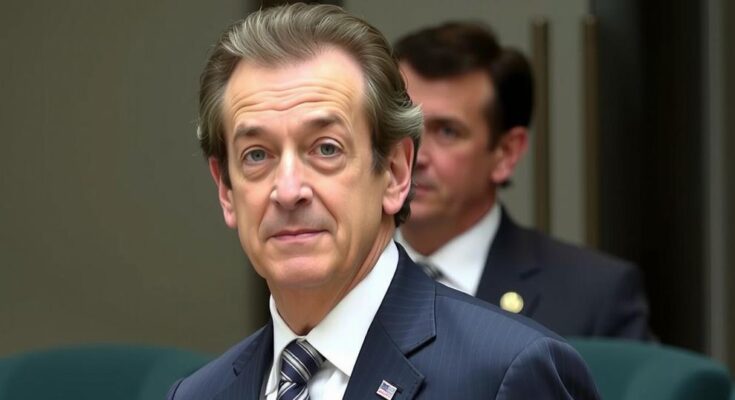Nicolas Sarkozy is on trial in Paris for allegedly receiving illicit campaign funding from the late Libyan leader Muammar Gaddafi. Sarkozy denies the charges, claiming they are politically motivated. The case is rooted in accusations made in 2013 by Gaddafi’s son, along with claims from businessman Ziad Takieddine regarding financial transactions that continued after Sarkozy’s presidential election. The trial will last three months, with Sarkozy facing up to 10 years in prison if convicted.
Former French President Nicolas Sarkozy has commenced trial proceedings in Paris, where he faces allegations of receiving millions in illicit funds purportedly from the late Libyan leader, Colonel Muammar Gaddafi, to support his 2007 presidential campaign. The prosecution contends that Sarkozy offered to assist Gaddafi in improving his standing with Western nations in return for the financial support. Sarkozy, who served as president from 2007 to 2012, maintains his innocence, asserting that the charges stem from individuals motivated by personal agendas aimed at his downfall.
The investigation was initiated in 2013, sparked by accusations from Saif al-Islam, Gaddafi’s son, who alleged that Sarkozy had accepted substantial sums for his campaign. Further complicating matters, Lebanese businessman Ziad Takieddine claimed to possess evidence indicating that payments from Tripoli continued even after Sarkozy’s election to the presidency. A total of twelve additional individuals, implicated in the alleged agreement with Gaddafi, are also on trial alongside Sarkozy, all of whom refute the accusations against them.
Additionally, Sarkozy’s spouse, Carla Bruni-Sarkozy, has faced charges related to this case, involving accusations of concealing evidence and complicity in fraudulent acts, both of which she vehemently denies. Following his loss in the 2012 elections, Sarkozy has found himself the focus of numerous criminal investigations, including an appeal against a February 2024 ruling that convicted him of overspending during his reelection campaign. This led to a one-year sentence, with half suspended, while a 2021 conviction for attempting to bribe a judge made him the first former French president to receive a custodial sentence, now slated to serve at home under electronic monitoring.
The trial, labeled as the “Libya connection,” will persist for three months, concluding on 10 April. Should Sarkozy be convicted, he could face a prison sentence of up to 10 years.
The allegations against Nicolas Sarkozy stem from claims that he accepted funds from Gaddafi’s regime to finance his 2007 presidential campaign. This investigation was catalyzed by statements from Saif al-Islam, who brought attention to supposed financial transactions. The subsequent admissions by businessman Ziad Takieddine alleging a direct link between Sarkozy’s funding and Gaddafi’s government intensified scrutiny. Following a series of criminal investigations post-presidency, Sarkozy’s legal troubles reflect broader questions of political corruption and accountability in France. His wife’s involvement in the case adds another layer of complexity to the proceedings, showcasing how political figures are often intertwined in legal disputes related to their past conduct while in office.
The trial of Nicolas Sarkozy marks a significant moment in French political history as it explores the intersections of finance and political power, particularly the alleged dealings with a controversial figure like Gaddafi. The case not only highlights the complexities of political funding but also raises questions about accountability and ethics in governance. As the trial unfolds, it remains to be seen how these allegations will affect Sarkozy’s legacy and the broader implications for political figures in France.
Original Source: www.bbc.com




